EarlyEdition
Cultivating Little Heroes

Baby Teeth are Important Too!
Hand Hygiene: Make it effective!

Cultivating Little Heroes

Baby Teeth are Important Too!
Hand Hygiene: Make it effective!
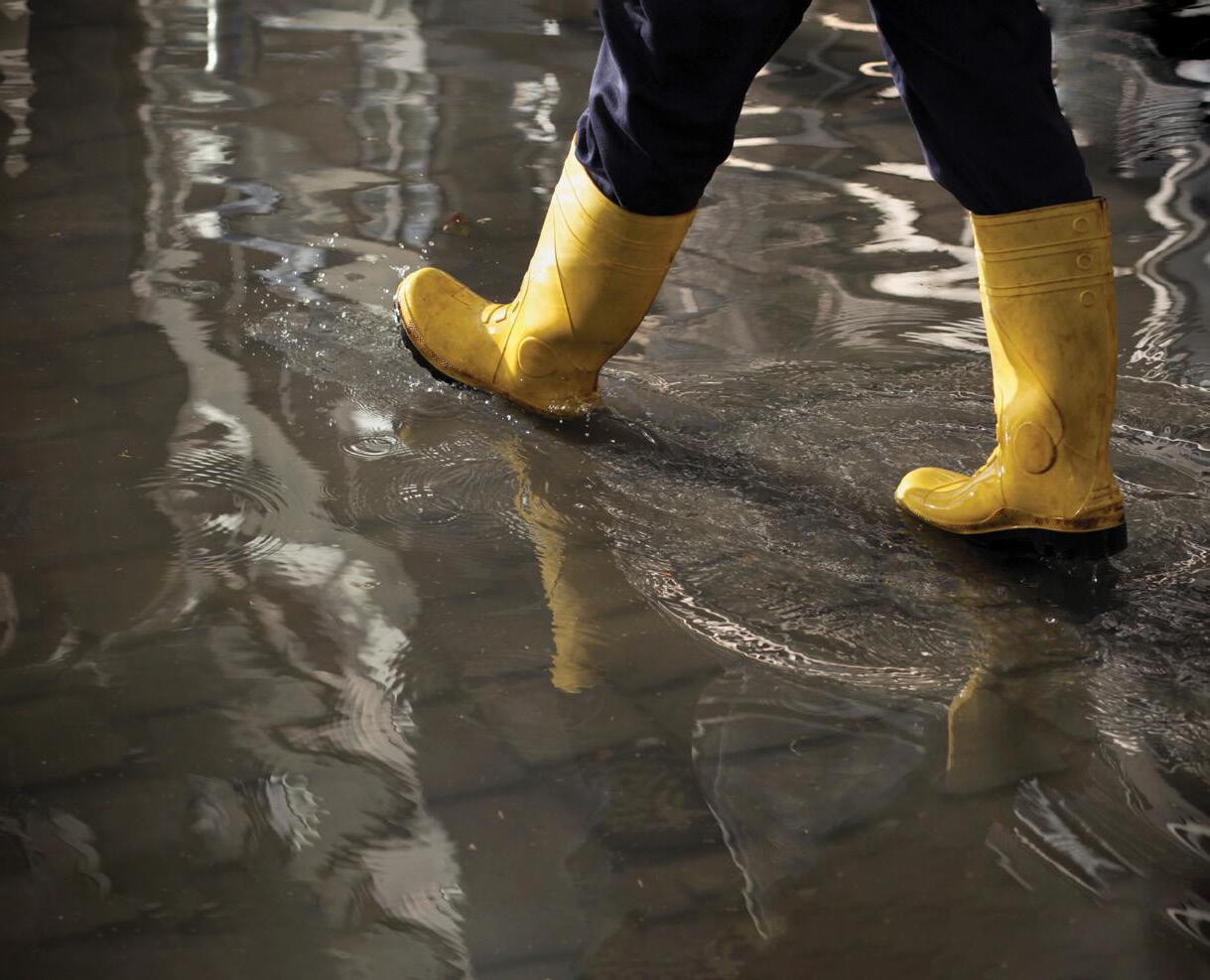
Backed by over 60 years of claims experience, Guild Insurance noticed an uptick in water damage claims at early learning centres in the last 10 years. Guild works proactively to reduce customer risks, and this increase prompted us to investigate how we could better help our customers lessen their risk of water damage, while keeping their business insurance premium increases to a minimum.
Fortunately, there are devices available that can be installed by licensed plumbers that monitor for unexpected water flow and stop it
before it causes damage. To test the effectiveness of these devices, we launched a leak-stopping device pilot with 10 of our customers and 2 suppliers, Water Secure Co. and Aqua Trip. The pilot was successful with multiple pilot participants discovering first-hand a reduction in water damage and related costs.
Paul Mondo, President of the Australian Childcare Alliance, and owner of Bimbi ELC in Airport West, Victoria, participated in the pilot and thanks to the Water Secure app notifying Paul of unusual water flow, he was able to
limit the potential water damage to just one broken pipe and keep the doors open, saving the service from certain flooding that would have required the centre close for repairs.
Become part of something bigger today, scan the QR code to learn more and access our preferred provider discounts on leak-stop devices.
on devices to prevent water damage
ACA Qld
Location: 2/10 Welch Street, Underwood Qld 4119
Mailing:
PO Box 137, Springwood QLD 4127
Telephone: (07) 3808 2366
Toll Free:
1300 365 325 (outside Brisbane)
Web: www.qld.childcarealliance.org.au

Email: qld@childcarealliance.org.au
Disclaimer: Articles published in this magazine are published as a service to readers and should not be substituted for specific advice in relation to any issue. While advertising in this magazine is encouraged, ACA Qld accepts no responsibility for the contents of the advertisements. Advertisements are accepted in good faith and liability for advertising content, goods or services supplied is the responsibility of the advertiser.
MANAGEMENT COMMITTEE
Executive
President - Majella Fitzsimmons
Vice President - Jae Fraser
Treasurer - Louise Thomas
Executive Secretary - Debra North
Committee Members
Dene Crocker
Kerrie Lada
Pam Maclean
Katy Mason
Kylie Petersen
Peta Pitcher
Brent Stokes
The conference committee has been busy planning next year’s conference with speakers already being sought and themes already being discussed. We thank those of you who filled out the conference survey, as your feedback helps us plan and decide our theme for next year, and we already have some exciting plans underway. More will be revealed in the next couple of months, so stay tuned for some spectacular announcements.
ACA Qld has been involved in consultations with the Department of Education over what Free Kindy funding looks like in 2024, the 2024 Regulatory Priorities, and the Government’s workforce plan.
Many of you who attended the AP luncheon on the Gold Coast at the beginning of the conference would have heard that the Government has hired a new Executive Director for Regional Operations, Ruth McFie.

ACA Qld has met with Ruth and had a detailed chat about regions and consistency within those regions. The department is currently working through systems and processes, and training systems for roles within the department. Discussions are currently around how to ensure all working in the Department of Education in regions understand what it is like working in the early learning sector.
ACA Qld meets regularly with the Director of Regulation and at our recent July Members’ Meetings, we were able to have a quick look at the Government’s new Regulatory Priorities for 2024. ACA Qld is in conversations with the Department of Education to ensure that services are supported to ensure better outcomes under these regulatory priorities.
On 11 August, ACA Qld was invited to attend parliament and meet with the Opposition Leader for Queensland on a forum on residential housing. Mr Crisafulli was very passionate and definite about how important it is for early intervention for children at a young age and what the economic benefits are by investing in the early years rather than programs when they are older. We look forward to more discussions with Mr Crisafulli and his team, and what this early intervention looks like to give all children the best start in life.
After listening to many services talk about workforce, ACA Qld is investing in a trial Peer Mentoring Program. The program originally ran in Canada and was introduced as a workforce initiative. Educators involved in this program in Canada reported an increase in wellbeing, feeling supported, increased job satisfaction, a willingness
to stay in the ECE sector, and a reduction in attrition for those services involved in the study. The program will be offered in 5 COPEs… Brisbane, Gold Coast, Toowoomba, Townsville and Mount Isa. If successful we hope to roll out in more regions.
ACA Qld has again been contracted by the state Department of Education to help with the rollout of the Kindy for All program and the Free Kindy program in 2024. ACA Qld will be hosting information sessions throughout the state and continue to be available to help services either through face-to-face support, Zoom meeting support, telephone support, or email support to implement this for families and communicate this with families. As always, we are only a phone call away so if you need any help, just reach out.
With the 2024 state election seeming just around the corner, ACA Qld has engaged a political strategist and a policy writer. We will be sharing more information with you as we develop the election manifesto and what we need to do with the engagement of all potential candidates leading into 2024.
Coming up in October is our AGM. Notices will be emailed out shortly. I look forward to seeing you there!
Majella Fitzsimmons ACA Qld PresidentThis quarter our efforts have focussed on paving the way for formal supported bargaining negotiations, continuing our engagement in the ACCC childcare inquiry progress and generating awareness of Early Childhood Educators’ Day.
The Australian Childcare Alliance (ACA) also acknowledge the urgent need for recommendations from the wholeof-government Review of child safety arrangements under the National Quality Framework (NQF), which aims to identify any gaps within, and opportunities for strengthening, the NQF provisions, around the safety and protection of children in Early Childhood Education and Care (ECEC).
Given the critical nature of this review, ACA greatly supports the need for an immediate response that brings about closing any safety gaps in the sector as soon as possible. A first, draft report with recommendations for improvements is expected by end of October 2023, with a final report due by end of the year.
Following the Fair Work Commission (FWC) hearing on 16th and 17th August, at which submissions were formally presented from all parties involved in the application for authorisation for a supported bargaining process, we are now waiting on the FWC to make a decision. If the FWC authorises the application, we can expect to hear an announcement in the coming weeks. Once authorised, the negotiations process can begin.
As part of this process, we are continue to call on the Australian Government to provide a direct wage subsidy to early childhood educators. We hope to commence the negotiations process in the coming months.
Following our ongoing advocacy around the outdated terminology used to describe the work and the roles within the early learning sector, ACA is heartened by the new changes to the Australian and New Zealand Standard Classification of Occupations (ANZSCO).
The new changes include moving away from outdated language of ‘child carer’ and ‘carer’ and instead using the term ‘educator’.
ACA and our fellow sector stakeholders consider these changes to be an absolute win for our sector. It is truly gratifying that our requests for change have been heard and that our sector and more importantly our early childhood educators are now receiving the professional recognition they deserve.
Following the Australian Competition & Consumer Commission (ACCC)’s interim report on the factors impacting the cost to families for early learning (childcare) services, the ACCC is now in the process of organising a number of roundtable discussions with invited stakeholders. ACA will attend a handful of these roundtable discussions in September.
Following these stakeholder discussions, the ACCC will publish a consultation paper identifying potential draft recommendations and/or draft findings and seek submissions in response. This will be ACA’s opportunity to provide our collective feedback on the factors impacting costs for families across the broad range of service providers Australia-wide, via a formal submission and follow up consultation. The ACCC will produce a final report for the Federal Government in December. We look forward to further engagement with the ACCC on this important matter, to ensure that their analysis of our sector accurately reflects the factors impacting service provider viability, quality and costs to families.
On a final positive note, Early Childhood Educators’ Day was a great success widely celebrated in services Australia-wide. As this community event was established by ACA Qld way back in 2011, we know it has a particularly special following among our members in Queensland.
If you haven’t yet done so, please be sure to visit the Early Childhood Educators’ Day website at www.EarlyChildhoodEducatorsDay.org.au to see more on how we celebrate and appreciate early childhood educators.
We hope that you and your team enjoyed thecelebrations with your families and children throughout the week of Early Childhood Educators’ Day.
Paul Mondo ACA President

TG’s Child Care in Urangan

A little MEG goes a long way!
Mindfulness, Empathy and Gratitude are essential life skills, and we can help children tap into their inner Zen. There are lots of fun and fascinating ways to cultivate mindfulness, empathy, and gratitude into a child’s daily routine.
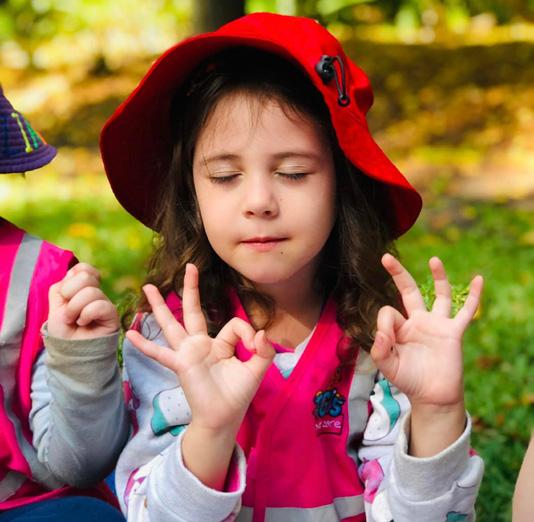
When children practise these regularly, they become kinder and more considerate. They have the tools to understand and process their own emotions, regulate their stress levels, and can identify when others are going through these emotions. Children learn to respect people and cultures and appreciate the gifts their environment shares with them.
Can you imagine your child sitting cross-legged, eyes closed, taking deep breaths? No, it’s not a dream; it’s mindfulness in action! Mindfulness helps children develop awareness of their thoughts, emotions, and surroundings, promoting focus and emotional well-being. But how do children actually learn this superpower?
a. Practising Presence: Encourage your child to engage in activities that require focused attention, like painting or building with blocks. Let them savour the present moment, free from distractions.
b. Mindful Breathing: Teach your little ones to take slow, deep breaths when they feel overwhelmed or stressed. It’s a simple yet powerful tool that helps them find calm amidst chaos. Use breathing exercises, such as blowing bubbles, tracing 5 fingers, bunny breaths and dragon fire breaths are fun and easy to do.
Empathy is like a magic pill that helps children understand, share, and connect with others’ feelings. It develops kindness, compassion, and builds strong relationships. But how do we cultivate this beautiful trait in our little ones?
a. Storytelling: Engage your child with books that celebrate diversity, compassion, and empathy. As they immerse themselves in these tales and adventures, they learn to step into others’ shoes and embrace their unique experiences.
b. Role-Playing: Encourage your child to engage in roleplaying scenarios where they can pretend to be someone else. This playful activity helps them develop a deeper understanding of others’ perspectives and feelings.


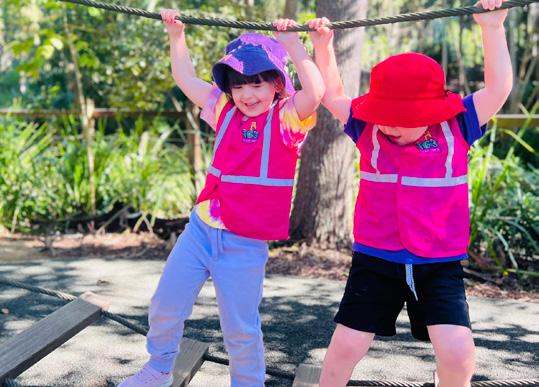
The next time you go for a walk in nature, why not practise a little MEG? A regular beach kindy opportunity with your child could help your child experience Mindfulness feeling the texture of the sand and how the water tickles the feet, feel Empathy for a sick turtle you meet on the beach, and Gratitude for the beauty of nature. Guiding our little heroes towards a life filled with mindfulness, empathy, and gratitude is a beautiful journey we can embark on together. Remember, it’s all about the joy of learning along the way! Let’s empower our children to shine bright and make a difference in this world!

3. Gratitude: An Attitude of Gratitude
Gratitude is like sunshine for the soul, warming hearts and fostering positivity. Teaching children gratitude not only brings joy and happiness but also instils a sense of appreciation for the little things in life. So, how can we sow the seeds of gratitude in our children?
a. Gratitude Journal: Help your child create a simple gratitude journal. Every day, ask them to jot down three things they are grateful for. By focusing on the positives, they’ll develop an attitude of gratitude. Have conversations together about what makes them happy and feel good.
b. Thank You Notes: Encourage your child to draw pictures and help them to write thank-you notes or pick a flower for someone to express their appreciation to family, friends, or even teachers. This simple act of gratitude teaches them the importance of acknowledging kindness.
As parents and caregivers, it is our privilege and responsibility to equip our children with the essential life skills they need to navigate the world with grace and resilience. By introducing mindfulness, empathy, and gratitude into their lives, not only do we nurture their emotional well-being, but we also set them on a path towards becoming compassionate and grateful individuals and empathic future leaders of the world.
fun and engaging water safety education resources is a passion that has driven Kids
Alive Do The Five for the past 25 years and we highly value our partnerships with early childhood educators across Queensland and Australia.
This year we have launched a new Wise Owl series of books and we are introducing a new collection of water safety songs. It’s important to keep water safety messaging top of mind for both kids and their carers right throughout the year.


Our second song, “CPR” was released in September and it teaches children what to do in an emergency, reinforcing the importance of calling 000 and starting CPR.
New songs will be released each month, with each song focused on a fun, engaging way to teach kids about being safe around water.
The Kids Alive new collection of water safety songs and toddler books are significant resources that can be used by early childhood educators to enhance the learning process and create more fun in play time.
The new Wise Owl books are designed especially for under threes. Adorned with adorable reimagined ‘baby’ characters for Boo, Lifesaver Lil and Wise Owl, the books teach water safety rules in various settings including pool, beach, home and farm. They are written in a simple rhyming style that’s just perfect for little ones. And you can rest assured knowing that, like all Kids Alive resources, these books and songs have been thoroughly vetted by water safety and early education experts.
These resources aren’t just for fun though, they’re designed to reinforce safety messages in various environments and reinforce what kids are learning at swim lessons. The aim is to make children as safe and confident around water as they can be.
It’s ten years since we last released new music, so we are super excited to introduce a new collection of water safety songs and toddler books. We’ve got eight catchy new tunes to share thanks to the incredible talent of award-winning song writer and singer Ryan Gittoes.
The first new song released in late July was “SUPER EYES” and we believe it’s our most catchy tune ever produced! “SUPER EYES” highlights the crucial role of supervision when children are in or around water and cleverly uses the concept of ‘super eyes’ to capture attention and engage young audiences.
We recently sent out the Wise Owl Series of books to early childhood education providers throughout Queensland. If you have not received the books, please get in touch with us at emma@kidsalive.com.au and we will send you the books. Alternatively, the books are available at the Kids Alive website in flip version.
You can find our new songs and all our music on Spotify, your favourite music streaming platform or on our YouTube channel (Kids Alive Do The 5).
The new books and songs are designed to complement each other, so a great idea is to read one book and sing one song each week. They can also be easily adapted to play based learning in the classroom. Reintroduce the songs and books throughout the year to reinforce important water safety messages. Spring is a great time as it’s the start of the swimming season again for most families.
Don’t forget the Kids Alive website has a wealth of other resources, located in the dedicated ‘Teachers Hub’. These include posters, animations, songs, music videos, puppet shows, concerts and safety tips.
If you love our resources and use them in your activities, we would love you to tag us on our social channels so we can share all the different ways educators bring water safety education to life.
www.kidsalive.com.au
 Christopher Phoenix > Phoenix Support
Christopher Phoenix > Phoenix Support
The Café de Flore is located less than a kilometre south of the Louvre, on the southern side of the Seine River. Classically Art Deco, the café became famous for its meeting place of Parisian writers, artists, and philosophers, including the likes of Picasso, and Albert Camus. On Valentine’s Day 2023, as I sat in one of its red leather booths, I asked the serveur where the philosopher Jean-Paul Sartre and Simone de Beauvoir used to sit. He pointed to the corner booth, and I could almost envision them there with their apricot cocktails, writing and discussing philosophy.

“Nos sommes nor choix,” or, “We are our choices,” is a phrase attributed to Sartre, and at face value, seems evident. However, the further we investigate this expression, the more we can find deeper meaning, including that of freedom, responsibility, identity, and even self-creation. Sartre’s position is that we are thrown into the world, and once we find ourselves here, it is up to us to decide how we are going to respond to our situation. He says that although we cannot always control what happens to us, we always have the freedom to choose how we respond to our situation, even if it is just the way we view it. His beliefs around freedom lead to his idea about choice. For Sartre, we are continuously choosing. In fact, even choosing not to choose is also a choice. As such, we are not our intentions but our actions, and since we live in the world with others, we are always responsible for those actions, which have consequences. Therefore, every decision we make, no matter how insignificant it may seem, is of importance, as it contributes to shaping who we are, as well as the world around us. So, in many ways, we are accountable for our lives, and the lives of others, as they are the direct result of the choices we’ve made.
You may be asking yourself how this all relates to wellbeing. Well, if every choice we make contributes to creating ourselves, this means we are always in a state of continuous becoming. In every moment we are simultaneously a mix of who we are up until that point, and what we choose to do next. Our identity, therefore, is not static. Instead, we are constantly evolving with every decision we make, which suggests that we always have the opportunity to change or redefine ourselves. Once we realise that we are not fixed beings, and therefore not as stagnant as we think we are, we can start making decisions that align more with what we truly value. Freedom and choice, therefore, allow us to cultivate a deeper sense of purpose and meaning. Every choice, seen this way, has the potential for joy, growth, and fulfilment. As such, wellbeing is not an end goal, but something we can develop in every moment. Wellbeing is something we can choose to pursue right now.
Back in the Café de Flore I’m reminded that, like the Seine River that gently flows through Paris, our choices determine our journey, with each decision shaping who we are. Through embracing freedom and choice, we have the opportunity for growth and wellbeing, at each step along our voyage. Let us remember that in every moment lies the potential to shape ourselves, and this choice remains always in our hands. Therefore, the choice is yours.
The Food Act 2006 is the legislation passed by the Queensland Government that defines the state’s food safety and sets out the specific responsibilities for managing the state’s food safety regulatory system. The Australia New Zealand Food Standards Code and the Food Regulation 2016 provides a more comprehensive explanation of the requirements of the Food Act 2006, and together they make up the food safety laws that apply to all food businesses, including early learning service providers.

The Food Act 2006 identifies the most vulnerable members of society that face the greatest risk from food contamination and food borne disease. These include aged-care, hospitals, certain types of caterers and early learning services.
These businesses that supply food to the vulnerable members of society are required under the Food Act 2006 to have a food license and an accredited food safety program.
To be accredited, a Food Safety Program must be assessed and approved by local council. However, before it can be submitted to council, it must be reviewed by an approved food safety auditor. If all the requirements have been met, the approved auditor will issue a notice of written advice that must accompany the submission to Council. Once approved and accredited, the business is subject to food safety audits according to a schedule decided by local council. The business must engage an approved food safety auditor to conduct these onsite audits, assessing if the business has complied with the accredited program.
To help early learning service providers develop their food safety program, Queensland Health has produced a tool kit that explains the methodology, including step-by-stepguides and templates. Early learning service operators are not bound to use these templates and are free to use their own variation if they meet the criteria outlined in the Australian/New Zealand Food Standards Code - Standard

3.2.1 - food safety programs. The following link will assist you to develop your own program, Develop a food safety program | Health and wellbeing | Queensland Government (www.qld.gov.au)
In most cases, the food safety program is prepared by the business owner themselves. However, some prefer to engage a food safety auditor to prepare it on their behalf. If so, then a different Food Safety Auditor is required to prepare the notice of written advice for council and conduct the onsite audits.
Australian / New Zealand Food Standards Code - Standard 3.2.2A

The Australian / New Zealand Food Standards Code has been updated to include Standard 3.2.2A. On the 8th December 2022, this new standard was drafted to help Australian businesses serve safe food to their community and to reduce the prevalence of food borne illness. This standard will come into effect on 8th December 2023, below is an outline of what you need to do to be ready.
Under the new standard, early learning services are classified as category A – food service and as such are required to instate the following changes.
What are the new requirements?
New requirements for Food Safety Supervisors
A food safety supervisor must obtain food safety supervisor certification at least every 5 years and the new standard has identified the course codes which must be obtained. If you are unsure whether your past training is adequate, you should contact a Registered Training Organisation (RTO) for clarification.
All food safety supervisor training must be conducted by an RTO; you can find one on the government website http://training.gov.au
The training competencies for food safety supervisors in the health and community services sector are:
HLTFSE001 Follow basic food safety practices
HLTFSE007 Oversee the day-to-day implementation of food safety in the workplace
HLTFSE005 Apply and monitor food safety requirements
Food handlers for category one and category two food businesses must have appropriate food safety skills and knowledge to handle potentially hazardous foods. Food handlers must have completed a food safety training course or have skills and knowledge of food safety and hygiene matters corresponding with their work activities.
A food handler training course must include information on:
• safe handling of food; and
• food contamination; and
• cleaning and sanitising of food premises and equipment; and personal hygiene.
Businesses may use online food safety training programs, such as Do Food Safely and I’m Alert which are free online training recognised by Queensland Health and local governments.
Use the following link to access the Do Food Safely, Resources for food businesses | Health and wellbeing | Queensland Government (www.qld.gov.au), check out the following link to see whether your local council has access to the free training I’m Alert, Customers of I’M ALERT Food Safety - FREE Online and Interactive Training Programs (imalert.com.au) Contact your local council to find out how you can access this training tool.
An internal training program may also be tailored to the business’s own activities and procedures, but it must cover the requirements above.
As a holder of an accredited food safety program, you would already be meeting this requirement, as under Australian / New Zealand Food Standards Code - Standard 3.2.1 - Food Safety Programs - Content of food safety program - 5 (f)A food safety program must provide for appropriate records to be made and kept by the food business demonstrating action taken in relation to, or in compliance with, the food safety program.
What you need to do is familiarise yourself with the new standard, this can be done by going to the Queensland Government website https://www.qld.gov.au/health/ staying-healthy/food-pantry/running-a-food-business/otherrequirements/food-safety-tools-standard
If you have questions, please contact your local council Environmental Health Officer, or feel free to contact me on the details below for assistance.
Narelle Davis BHlthSc(EnvHlth)/Food Safety Auditor FSA 201 Food Safety Solutions QLD
Mobile: 0481 817 233
Email: admin@foodsafetysolutionsqld.com.au
Website: www.fssqld.com

Educating children to become environmentally responsible for their environment is a big part of our learning goals at Redbank Plains Early Education Centre. Exploring different ways we can do this through our room Sustainability projects that has had different outcomes and reactions for our children and families. Gardening projects are embedded throughout our service, with all rooms undertaking their own experiments.

Hydroponics is a highly efficient method of growing plants. In soils, nutrients and water are randomly placed, and often plants need to expend a lot of energy to find the water and nutrients by growing roots to find them. When growing hydroponically, plants do not need to compete with weeds and each other for the food and water that is in soil. This is a method of planting that our educators and children have been using.
As a centre we have used vegetable scraps from our daily morning teas to grow hydroponically which has resulted in our vegetable garden flourishing with new fresh vegetables and will end up reducing the ordering we do for vegetables by harvesting our own with the children. It is important for children to understand where their produce comes from, which then sets them up for the future by creating sustainable habits. The kindergarten children regularly plant these out into our vegetable garden. It has also sparked an interest in our families
who have being doing their own experiments in their homes. Our little gardeners in the Toddler room focused on their project through growing seeds using cotton wool in a bag which was hung on the windowsill. Throughout their learning discoveries it took 21 days for their seeds to sprout which they then were able to transfer into glass jars to continue their growing. The young toddler’s expressions when they begin to see a seed sprouting is heartwarming! They show such enthusiasm and are exploring empathy and taking care of living things. At such a young age they are able to explore and wonder about their environment and the world around them.
Our Kindergarten children participate in a “Veggie Program” each month. Throughout this program the children discussed what they need to make plants grow. From this discussion the children began to predict the plants growing and created their own experiment to see which seeds would sprout first, either growing with dirt or without dirt. They created their own chart and made their predictions, educators also got on board with their predictions which they favored the without dirt theory

while the children favored with dirt. Surprisingly to the children the seeds grew quicker without dirt. Through this experiment we tried different vegetables including carrots and celery growing in water and watched as they grew to then transfer into our hydroponics. As we focus on a new vegetable each month, we have been able to see all different types of vegetables grow and create sprouts. Our favorite one to watch is snow peas as the children love the winding and curly vines.



“It is important for children to understand where their comesproduce from.”
The journey from Meeting to Exceeding the National Quality Standards for Early Childhood Education and Care typically presents unique challenges to each service - but there may also be common threads to help guide the way for others. Here, the leadership team at Kinglake Ranges Children’s Centre, north of Melbourne on Taungurung Country, share their deep dive into wellbeing and how it served as a catalyst for positive change.
Rewind to late 2015 and the service Director, Sue, recalls the culture at KRCC was largely adult-directed and focused on control. Access to the outdoor space was restricted, routines were adult-led and timetabled, and there were limited opportunities for creative play and inquiry. Accident reports of children hurting each other were a daily occurrence and the relational climate was low.
The impact on children was captured in statistical data from the Australian Early Development Census (AEDC) a national assessment of children in their first year of school conducted every three years which seeks to track children’s development. KRCC is the sole kindergarten provider in their AEDC zone, so the data captured presents a very clear snapshot of how their children are tracking developmentally. The 2015 census indicated one in four of the children leaving the service for their first year of school were classed as ‘developmentally vulnerable in one or more domains’ (significantly more than the state and national averages).
Under Sue’s lead, a team-wide crisis reflection identified four areas of focus as they shaped their strategic direction and sought to grow from reactionary to visionary. These were:
1. Improving relationships with children
Seeking a contemporary, evidence-informed approach to behaviour guidance and wellbeing, led the team to Phoenix Support for Educators and the Phoenix Cups Framework. Embedding the Cups Framework in the service philosophy, and in a series of trainings and coaching sessions inspired a new understanding of all behaviour as being the reaction of an unmet need. It also gave the team a common language for understanding their own wellbeing as well as that of their colleagues, the children, and families with whom they work.
2. Bush Kinder
Reflecting on the cortisol-reducing impact of time in nature, led the team to commit to implementing a trail-blazing Bush Kinder program in the nearby National Park (on Wurundjeri Country).

3. Environment
Reflecting that, ‘If the environment was our third teacher, she was speaking a language of chaos,’ led the team to research ways to calm the environment, re-painting the rooms in neutral colours, replacing plastic materials with natural ones and embracing the creative potential of loose parts play.
4. Leadership
In true commitment to distributed leadership, all leaders undertake continual learning, research, and reflection, paving the way for a new culture at KRCC.
Partnering with Phoenix Support for Educators, KRCC began a long and ongoing collaboration to embed the guidance approach to behaviour support and ‘Cup filling’ practices for the entire learning community, to the point that the Phoenix Cups Framework warrants its own place in the service philosophy alongside: Nature, Relationships, Time and Knowledge.
Initially, every member of the team engaged in the Phoenix Cups Quiz, gaining an understanding of their own unique needs and strengths profile. ‘That really gave us a common language for understanding behaviour and wellbeing – our own and the children’s,’ says Sue.
Since then, Sue has noticed subtle shifts in how the team incorporates the Cups Framework into their programs and practice. Much as the Early Years Learning Frameworks have become second nature, she says the team’s thinking when it comes to the Phoenix Cups approach to wellbeing has gone ‘next level’. ‘Where once the main focus of this framework was on understanding how our program can empty or fill a child’s Cup,’ she says, today the Cups awareness is more internalised.
‘The (Cups) language is really noticeable once we start to problem solve. For example, when unpacking dynamics in our kinder room, the conversation centered around the unmet needs of the children and the corresponding Cups profiles of their educators. (We’d ask) did the educators also have unmet needs (empty Cups) that we also needed to focus on, in order to then better support children to meet their own needs? The Cups Framework provides a much more holistic view to our overall approach to pedagogy.’
The new-found confidence in understanding human wellbeing led to shifts in programming too. Today the service runs a highly flexible, indoor-outdoor program where children of all ages are free to self-select their area of play and engage in healthy risk-taking. Children often play barefoot and demonstrate their capacity for risky play – while accidents and injuries have dropped.

Affirming the positive impacts of their efforts, AEDC data traces a powerful tale of improving developmental outcomes. Consistent with the findings of ACECQA, which assessed and rated the service as Exceeding in all areas in late 2022, AEDC data sets from before, during and after the strategic turnaround in practice and philosophy track a significant improvement in children’s learning and development. The percentage of children classed as ‘vulnerable in one or more domains’ in their first year of school has dropped from 24.1% in 2015 (in excess of the state and national averages) to just 7.8% in 2021 (a fraction of the state and national averages).
It took time, vision and effort to change some hardheld beliefs at KRCC about children’s behaviour, but the benefits of understanding human beings and incorporating humanistic and positive psychology through the lens of the Phoenix Cups has paid dividends, transforming this learning community for the benefit of all.

Early childhood caries (ECC) is one of the most prevalent, yet preventable diseases in Australian children under 6 years of age. ECC is limited to the baby or primary teeth that are replaced by permanent teeth between ages 6 and 12. If we can catch this early enough, we could relieve pain, improve health and decrease the load on the public health system.
According to the Australian Dental Association (ADA): “By 5 years of age, 1 in 3 children aged 5-6 years have already had tooth decay in a baby tooth and this goes up to 1 in 2 for Aboriginal and Torres Strait Islander Children.” Dental decay is one of the most costly and preventable diseases in our society.
Having worked for over 7 years in private practice, both myself (Dr Sim) and my business partner (Dr Tarra) realised that children were being brought in far too late for their first dental visit.

We do not blame parents for this at all! There is a lack of pre and post-partum education on Early Childhood Caries prevention and new parents have so much to learn. There have been plenty of times a child has been brought for their first visit to a private dental clinic at the age of 6 or 7 with multiple holes, pain and the need for extensive treatment. Now, instead of a fun first visit - there might be the need for needles or uncomfortable x-rays.
We do not want this to be a child’s first exposure to the dentist! We want a life-long, healthy relationship with the dentist to form from a young age. That is why we have started Delivering Dental - by bringing the dentist to childcare centres we aim to have a FUN and SAFE first dental visit in the children’s own environment.
Parents have the primary responsibility for teaching their children how to look after their teeth and gums. However, childcare providers have an important role in supporting and enforcing what children learn at home!

Some ways to achieve this could be:
• Bring in a Dental Service (such as Delivering Dental) to perform comprehensive dental check and cleans on the children in your service
• Advising parents if they notice any sign of tooth decay (stained teeth, swelling, injury to teeth, bleeding gums, pain or discomfort when chewing)
• Celebrating Dental Health Week (First Week of August)
• Never put babies and young children to bed with a bottle! And encourage parents to cease this habit
• Providing age-appropriate oral health education and books for children
• Think about implementing a toothbrushing program (some children may not brush their teeth at home and the introduction of a toothbrushing program provides an opportunity for families to learn about good oral health). Be sure to implement proper toothbrushing practices - refer to the Australian Dental Association for proper techniques for different ages of children
• Never dip dummies in any liquid other than water
• Offer water to rinse out their mouth after each meal and snack
• Offer children hard foods rather than sticky foods that might get caught in their teeth
• Have print outs of how to handle dental emergencies (for example, chipped tooth, avulsed tooth) - you can find these at https://dentaltraumaguide.org/
Our passion for Early Childhood oral health led us to create Delivering Dental. We bring our dental chair and tools and require only a space from early learning services! There is no cost to the early learning service.

It makes for a super fun and easy going day. Children feel comfortable in their own environment and with their educators. We often have children fighting over who will jump in the chair first!
We want to pick up issues that might not have been found until later, thereby preventing further issues!
We aim to address common barriers to oral health such as cost, fear and access (distance or time poor) by visiting the early learning service, using government funding for eligible children, reduced fees for ineligible children and providing oral health education.
We currently service from the Sunshine Coast to the Gold Coast. If you are interested in our service, please find us at www.deliveringdental.com.au or scan this QR code!
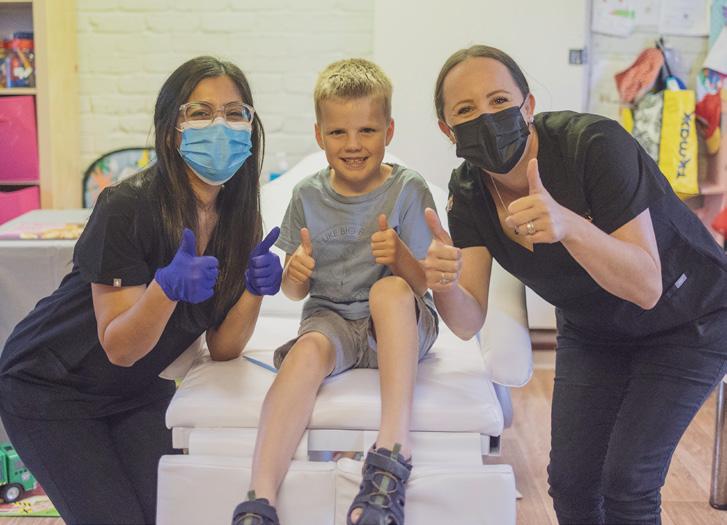
At Winston Glades Early Education Centre we are extremely passionate about our Nature Play and Bush Kindy program. For our Kindergarten children, Bush Kindy is absolutely the highlight of their week.


Twice a week, our nature neighbour becomes our classroom for the day. And what an amazing classroom it is. Breaking down the barrier between learning and the natural world, our children are able to experience the power of nature. We are extremely fortunate to have a Bushland right in our backyard, with gates in our playground that provide us with premium access to this incredible land. Nature play to us is all about extending upon and providing opportunities for our children to be courageous, take risks, create powerful rituals, and to be the best, most happiest versions of themselves.
Bush Kindy is about the journey, and what an incredible journey it has been. The walk to Bush Kindy is slow and relaxed, with many stops along the way as children take their time exploring everything that the Bushland has to offer. No matter where we stop along this path for the day, the very first thing we do is Acknowledge the Land and the People, thanking them for the bountiful opportunity they provide to live, learn and play. Not only do we thank the land, we engage in a deep listening practice called Daddirri. During Dadirri, we listen for 3 minutes to nature’s symphony. Dadirri provided us the time and space to actively explore nature using only our sense of hearing. Sounds that we may not notice during busy periods of play become the focus. Dadirri brings us a sense of peace and is a ritual that adds so much meaning and connection to our experience and land.
“The best swing ever!”
With smiles upon their faces, the squeals and laughter of pure joy and happiness can be heard all around as the children scatter to explore and engage with what’s around them. Bush Kindy is where they explore and develop their creativity and imagination, become confident risk takers, develop their resilience and emotional regulation, and learn what it is to be a conscious, respectable, responsive and active member of the world. They become advocates for the environment, engaging in sustainable practices and taking care of the land around them. The natural world and the resources it provides enhances the learning experience and that much is evident to all who are honoured to witness these experiences.
At this age, children see the magic in the world, they play pretend, and they make wishes. During Bush Kindy this is evident within their play, and as they use what is around them. They use sticks as broomsticks, rocks as fairy houses, logs to create bungalows, and leaves to make magic potions. One of our favourite things to do at Bush Kindy is to make swings. The children collectively hunt for the biggest logs. The children then assist the educators to tie it around a tree to make, in their words; “the best swing ever”.
Our Bush Kindy day starts at 9am and ends at 2pm. With full hearts and minds, the children, bright-eyed, make the journey back to the centre. The learning that occurs in these hours is honestly some of the most incredible and exciting moments to observe and bear witness to. Bush Kindy develops the children’s ability to make their


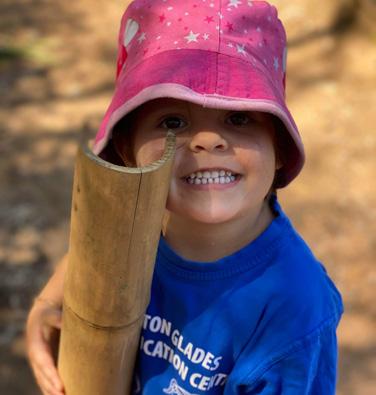


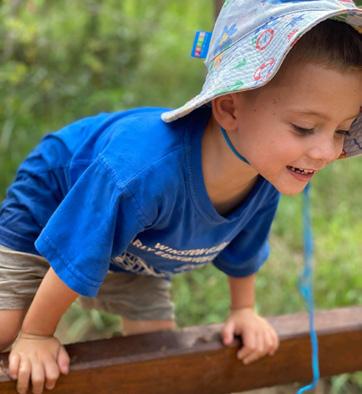
own decisions, provides space for the children’s voices to be heard and their willingness to engage and learn is increased ten-fold. To us, Bush Kindy is magical, not only for the children, but for the educators as well. We have the opportunity to allow our inner child to come out and play. It doesn’t get more incredible and healing then that.

It is important that any business regularly evaluates their strategic plan. Often businesses will only consider their strategy when they are under financial stress. The current economic environment highlights the importance of having a robust and dynamic plan which has clearly set a vision for the business and has identified the necessary steps to achieve this.

Your strategic plan needs to be relevant and easily understood. Importantly it must be aligned and communicated with all key stakeholders. In our experience assisting businesses to develop their strategic plan, the most successful were those where there was buy-in from key participants. Many businesses tend to operate with a loose vision or strategy conceptualised in the owners’ thoughts which is not clearly documented. The concern with this approach is that it can be difficult for everyone to be moving in the same direction if not everyone knows which direction to go in.
Your strategic plan should centre around identifying where you want your early learning services to be. Your objectives should be unique to you which may be to expand and grow, consolidate, innovate or be the leaders in providing the best education and learning outcomes. This helps to clearly define your vision for the business.
Once your objectives are identified, you can compare this to where your operations are currently. Your strategic plan should then outline the actions required to bridge the gap.
It is a common issue for many early learning services across Australia that there are significant labour shortages and an increase in occupancy rates due to difficulties attracting and retaining team members, new services opening within close proximity to existing services and cost of living pressures on parents. The results of a recent survey we conducted at the ACA Qld National Conference highlighted that staffing issues and occupancy levels remain a key issue for the sector.
A well-considered plan looks at all aspects of a business to execute its strategic objectives. Key aspects that should be considered are finance, customers (being parents and children), processes and facilities, services and
innovation and the people in the business, notably team members. These aspects collectively may be defined as your corporate platform. Having a well-defined plan that considers the business as a whole means there is less likelihood of reactionary behaviour. Reactionary behaviour can lead to gap stop actions where resources are diverted from areas of the business which are core to achieving its vision.
When reviewing your corporate platform, you can consider the key aspects from a particular perspective to address issues. Below are examples and commentary on how some of the elements could be considered.
The foundation of any early learning service or business generally is its people. Services often rely on their director to run the day-to-day operations of the business while the quality of educators can impact the perceived quality of care by parents. Consideration should be given to their well-being and professional growth. Strategies to attract the best people in these roles depends on the vision of the business. The findings from our recent survey suggested team members would feel more valued in their role through recognition and promotion, provision of additional support and resources and an increase in their remuneration and incentives. Factors that motivated educators and other team members to stay with their current employer included workload balance, flexible working arrangements, work culture and the location of the centre.
In the early learning sector, parents are not merely customers but active partners in their child’s development journey. Establishing strong relationships with families is vital to building trust and loyalty. Open communication channels, regular updates on a child’s progress, and a receptive approach to feedback can help create a sense of confidence among parents. This trust is crucial, as parents are more likely to choose services that prioritise their child’s well-being and actively involve them in their child’s education journey. By fostering strong connections with families, early learning providers can improve retention rates and enhance their reputation within the community. Our survey indicated that over 90% of educators felt valued in their role by the parents and guardians.
While budget constraints may exist, allocating sufficient funds for competitive wages, professional development programs, and employee benefits should be considered to attract and retain skilled educators. By demonstrating a commitment to investing in their workforce and services, early learning services can create a positive work environment that cultivates loyalty and dedication among team members, ultimately reducing the need for frequent hiring and onboarding. Preparing cash flow forecasts and budgets provides an avenue to visualise the performance of the business and ability to spend in these areas.
The early learning sector is expected to continue to face significant staffing challenges and occupancy issues in the short to medium future. By reviewing or embracing a well-defined corporate platform, early learning providers can address these challenges more effectively in a proactive way. Empowering their workforce, building trusting partnerships with families, ensuring financial stability and investments in team members, enhancing operational efficiency, and embracing innovative solutions are imperative to achieving your strategic goals.
William Buck can assist you with developing and implementing your strategic plan as well as undertaking alignment exercises to ensure all key stakeholders are working towards achieving the vision of your business.
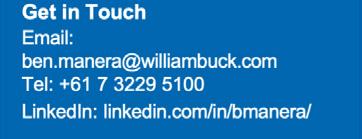
We understand the challenges that come with owning and operating an early learning service. Call our team on 07 3229 5100 or email qld.marketing@williambuck.com to book a consultation today.

“By fostering strong connections with families, early learning providers can improve retention rates and enhance their reputation within the community.”
— Strategic and tax planning
— Practice structuring
— Exit planning and retirement
— Personal wealth management
— Asset protection
— Compliance requirements
The results of a recent survey we conducted at the ACA Qld National Conference highlighted that staffing issues and occupancy levels remain a key issue for the sector.
To view the full report contact our advisors qld.marketing@williambuck.com
May 5 was World Hand Hygiene Day. Drawing on the expert knowledge of the WHO and the NHMRC we explain how to make hand hygiene effective without causing a skin irritation.

What is Hand Hygiene?
Hand hygiene is the term used to describe the methods used for removing dirt and germs from your hands. The method used may vary depending on the environmental conditions - types of germs involved and the visibly of dirt or grease. The article is based on the typical conditions encountered by a food handler.
Why is Hand Hygiene Important?
Hands play a significant role in the spread of infection. They act as a vehicle to transport germs and disease from one place or person to another. This risk can be mitigated by practicing effective hand hygiene.
To prevent the spread of infectious diseases, your hands must be washed, cleaned and dried in a particular way.
Studies in America have proven that promoting hand hygiene in a childcare/educational setting can reduce gastrointestinal and respiratory illness and improve levels of attendance.
Of the 3 common methods, soap and warm running water delivers the best results. If unavailable, then alcohol-based hand sanitiser with at least 60% alcohol should be used.
1. Soap and Water
• Has proven to be the best method for hand hygiene, particularly when your hands are visibly dirty.
• Soap alone can’t remove dirt or kill germs. This is only possible when combined with running water.
• Rubbing your hands with the detergent in soap loosens the dirt and germs, while the running water removes and rinses them off your skin.
• Effective hygiene requires at least 20 seconds of hand washing. More is necessary for hands that are particularly dirty or greasy.
2. Alcohol-Based Hand Rubs
• Alcohol-based hand rubs are also called antiseptic hand rubs, waterless hand cleaner, hand cleaning gel, and hand sanitiser.
• Have proven to be a fast and effective way to reduce the number of germs when soap and water are not available.
• Reduce the number of germs but won’t remove dirt from your hands.
• Are a good substitute for soap & water when performing multiple tasks or touching multiple surfaces.
• Should be placed at the entrance of a childcare centre to remind parents, carers, and children to clean their hands when they enter and leave.
WARNING - Should only be used with adult supervision and kept well out of the reach of children due to the risks associated with swallowing hand cleaner, inhaling it, or it being splashed in a child’s eyes.
3. Antibacterial Soap
• Kills some (but not all) bacteria.
• Does not kill viruses.
• Not recommended for a childcare setting.
How you dry your hands is just as important as how you wash them. That’s because damp hands can pick up and transfer up to 1000 times more bacteria than dry hands.
Drying your hands thoroughly helps remove the germs that remain after rinsing. But it has to be done the correct way. Here is a review of the 3 most common methods:
1. Disposable Paper Towel

• Has proven to be the best method.
2. Warm Air Dryers
• Is an effective alternative.
• Has a number of drawbacks – takes longer, limited to only one person at a time, and is often not long enough to ensure dry hands.
3. Cloth Towels
• Is the least effective and the method of last resort.
• Towels should not be shared and hung up to dry between uses.
• Towels must be laundered regularly to reduce the risk of recontamination or cross-contamination.
Skin provides a barrier against germs. However, frequently washing your hands can cause irritation and can damage your skin. Damaged skin can allow germs to enter the body.
Irritant contact dermatitis is commonly caused by the frequent and repeated use of hand hygiene products - especially soaps and other detergents. This together with the frequent use of rough paper towel can cause excessive dryness.
• People often develop an allergy to one or more ingredients in hand hygiene products.
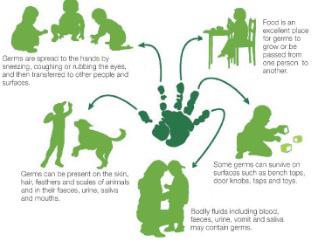
• Symptoms can range from mild irritation to severe itching, cracking, and bleeding,
• Regularly moisturising can also help reduce dryness and irritation.
• Hand care products that contain soothing ingredients (emollients) are readily available and can reduce symptoms.
Tips to minimise skin reactions:
• Avoid products that contain fragrances and preservatives.
• Wash your hands with warm rather than hot water.
• Avoid rough varieties of paper towel.
• Wet your hands before applying soap.
• Ensure your hands are properly dry before putting on gloves.
• Purchase hand hygiene products (cleaning agents, soaps, and hand moisturisers) that are chemically compatible and that work effectively together. If in doubt – check with the manufacturer.
•
In recent years there has been a dramatic increase in the use of cleaning swipes that offer convenience for cleaning everything from hands to glass and even floors. Before using swipes, it is important to always read and follow the directions on the label to use these products safely.
Hand sanitizing wipes with at least 60% alcohol kill germs on your hands.
Baby wipes are not designed to remove germs from your hands and are not recommend for cleaning your hands. They may make your hands look clean, but baby wipes and similar products typically do not have at least 60% alcohol.
Disinfecting wipes are designed to kill germs on surfaces. Do not use disinfecting wipes to clean your skin because they may cause irritation.
The method of hand washing recommended by the NHMRC:

• Recommended time spent should be 20 to 30 seconds.
• Time is not arbitrary but scientifically proven.
Research suggests - that like brushing your teeth, most people do not actively monitor the time they spend washing their hands. As a result - many fail to spend the required minimum of 20 seconds. Consequently, they haven’t practiced effective hand hygiene and can still transfer germs and viruses without knowing.
Set up a timing device the next time you wash your hands. Start the timer and wash your hands as you would normally. Only look at the timer when you finish to check how much time has passed. If this is less than 20 seconds, then repeat the exercise while observing the required 20 second minimum.
Chances are you’ll be surprised to learn you have not been spending the required 20+ seconds.
Learning Stories originated from a groundbreaking research initiative in 1998, led by Professor Margaret Carr. This initiative aimed to redefine assessment under the backdrop of a new curriculum. The key tenets of well-crafted Learning Stories, seamlessly integrated into the curriculum, are rooted in narrative-based, formative assessment. They took account of key ideas in the curriculum including belonging, wellbeing, contribution, communication, and exploration.
The Purpose and Impact of Learning Stories:
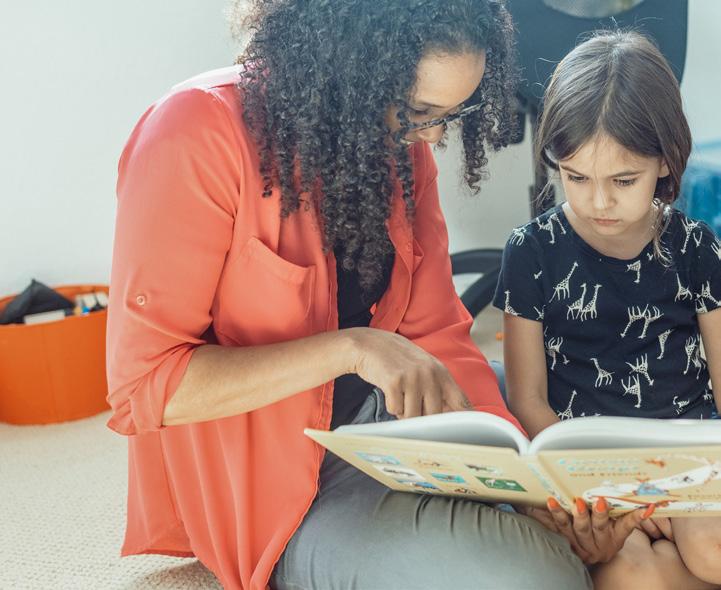
The essence of Learning Stories lies in their ability to make a positive impact and cultivate learning opportunities for children. For effective implementation, these stories need to be timely (capturing the learning context closely), shared across the team (enabling educators and stakeholders to support the learning journey), and structured with clear headings that foreground the learning process. The triple headings are vital to ensuring learning remains at the forefront. These headings not only help educators discern the noticing (story), recognising (analysis), and responding (planning) aspects of the story but also provide a comprehensible structure for families and children.
It’s important to remember that educators sometimes tend to remain descriptive and miss out on the vital analysis when the three parts of a Learning Story are merged into one narrative. The three-part format offers educators a platform to discuss valued learning with families, transforming them into long-term advocates for their children’s growth.
Title: Infuse Interest!
Titles become literary hooks for both children and families. For instance, titles like ‘I can do it,’ ‘Budding photographer,’ ‘Elsie the pattern maker,’ ‘A quiet moment,’ or ‘Embracing the challenge’ captivate attention and evoke curiosity.
The story and Photos: Noticing
Approach writing from a standpoint of immense curiosity about the child’s actions and words. Your words should resonate with genuine care, as they hold significance.
Writing directly, like composing a letter to the child, often works well. Do the families perceive your genuine interest in their child? Remember, photos also narrate the story, enabling children to recount their experiences. Even very young children can decipher learning experiences through photographs. Opt for images that encapsulate the emotions of learning—concentration, excitement, intent— and showcase learning progression.
Elaborate on something significant to the child and explain why it marks a pivotal moment in their learning journey. Describe the context, participants, and the child’s role in detail. Highlight if the child played a supportive role or contributed solutions. Include the child’s words when possible, capturing their exact expressions or general sentiments. Pen your narrative with joy, love, and boundless energy.
“Write stories that make a difference. Recognize the privilege of entering children’s lives this way. This is the trace of your professional life.”
– Wendy Lee, 2015
To enhance your Learning Story writing skills, explore other Learning Stories available on platforms like the ELP website (www.elp.co.nz) or in books. Learn from these experiences.
The Learning Story truly comes to life during the analysis phase. Until then, it’s just a story. Experiment with methods to make learning visible to children and families. Here are some examples to guide you:
Start with first-person perspective—use “I” to convey your viewpoint on the learning. Reflect on why you chose this specific story. For instance, “I noticed your innate curiosity in problem-solving, Kieran,” or, “These moments, Dennis, embody what drives me: your transformation from hesitancy to enthusiasm, like a supernova!” Dive deep into your response to the child’s learning moment and communicate your excitement. The analysis should be a reflection of your enthusiasm.
There are numerous learning moments daily in an ECE setting. So, what makes the chosen moment significant? Why did this particular learning instance intrigue you?

Connect this Learning Story to other stories for the child. Discuss the learning strategies, the child’s disposition, skills, and knowledge gained, and how curiosity and perseverance played a role. Explain the story’s importance in the context of the child’s overall development.
This phase solidifies the Learning Story’s integrity. It’s where you ponder on how to nurture the learning further. You begin to plan ways to expand learning. Think about the future possibilities and opportunities. Here are questions that can guide you:
• Where can this learning lead?
• How can we stretch and enhance this learning?
• What are the next steps and future prospects?
• Where can we take this learning?
While planning, listen deeply to the child’s journey and stay responsive. The analysis offers insights into individual planning threads, connecting the narrative and analysis. Reflect on the child’s learning community and how it supports their growth. Consider adding complexity and maintaining continuity. Ensure resources and equipment are available, and seek to discover more about the child’s intentions.
In the vibrant tapestry of Learning Stories, we uncover not just the growth of young minds, but also the artistry of educators’ practices. Your teaching style paints the canvas of narratives, illustrating your dedication and passion. Stay intertwined with your young learners, kindling their curiosity and wonder. As each educator weaves their distinct perspective and insights into these stories, our educational tapestry becomes richer and more vibrant. Remember, every voice is a vital note in this harmonious symphony. Let families’ voices harmonize with yours, creating a chorus of influence that shines through.
As we read, reflect, and celebrate each other’s Learning Stories, we sculpt a thriving community of learners. This alliance thrives on shared wisdom, constructive feedback, and an unyielding spirit of growth. In this symposium of Learning Stories, we discover that unity begets strength, and collaboration infuses depth into Learning. Let this paradigm inspire you to foster your own haven of learners, a space where curiosity blooms, relationships flourish, and knowledge sparkles. Through collective learning and sharing, we construct an unbreakable bond—a vibrant community where each Learning Story, each voice, each insight is a cornerstone. This is how we craft an oasis of wisdom and growth, nurtured by your commitment and our collective journey.
Ruichen, recently your friends have been creating models with the mobilo and this has taken your interest. Today you selected a card to make a crane and you began to collect the pieces you needed.

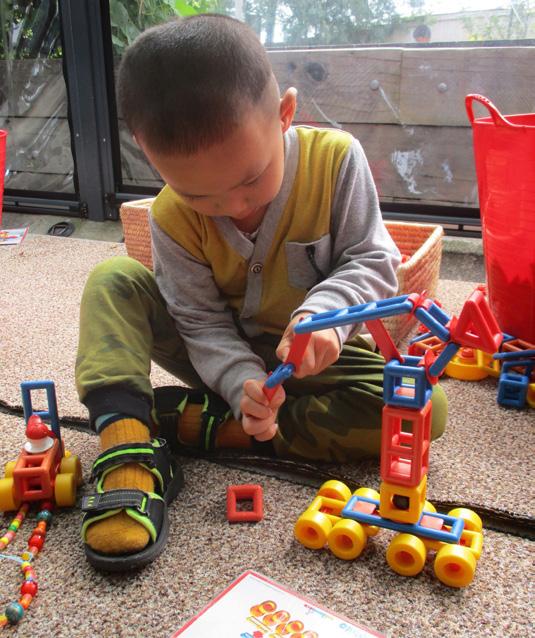

You showed me the card and I could see you were keen to recreate this design. There were quite a few pieces to collect and Ruichen, you identified each piece and hunted through the bucket to find a matching shape. With all your pieces gathered you set them out beside the instruction card and now you were ready to begin the construction process. You took your time to ‘read’ the instructions and through ‘reading’ the pictures you gained an understanding of how to create a crane. Ruichen, you worked with such focus and your crane quickly took shape, you compared your model to the picture and you were very satisfied with your design.
What learning do I see happening for Ruichen?
Ruichen, you are motivated to set your own tasks for your learning and today we saw you following your interest to create with the mobilo. You worked with such confidence and focus and independently built your crane. You were so resourceful and accessed the pieces required to create this design. The instructions were illustrated with pictures and this empowered you to read and independently work through each step to build your crane.
Reading pictures is the beginning to reading words and Ruichen through reading the pictures you developed your knowledge and understanding of the steps to follow, and this empowered you to successfully complete the process. There is an element of mathematical exploration woven through this task too and I could see you matching and classifying the geometric mobilo pieces, you were systematic in your approach, and followed the method to build your own design.
How will we stretch and grow your learning further Ruichen?
The picture cards are one way to create mobilo designs Ruichen and another possibility is develop your own unique designs, you can do this by tinkering. This is when we play around with ideas, explore and experiment with possibilities and think of ways to bring our ideas to life. This may be with the mobilo or you may like to explore the many other loose parts in the learning environment at kindergarten.






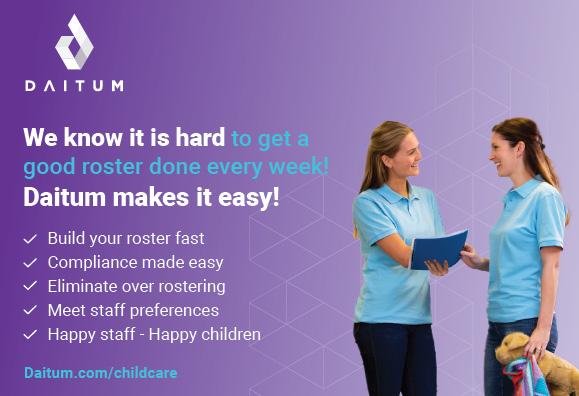
CAECE is delighted to present recent graduates who have completed their Certificate III in Early Childhood Education and Care and Diploma of Early Childhood Education and Care.

Over the last quarter we have had the opportunity to congratulate CAECE graduates from both our Diploma and Certificate III qualifications. With the ongoing support from our lovely CAECE trainers, students have been guided to achieve their goals in becoming fully qualified educators.
If you, or someone you know, are interested in studying and working towards your qualifications in early childhood education and care, our friendly staff and trainers are willing to guide and support your early learning journey! For more information please contact our team on 07 3299 5784 or email admin@caece.com.au

CAECE would like to congratulate the following graduates and wish them all the best for their future as an early learning educator!
CAECE graduates for the last quarter:
Amber: Camp Australia - Certificate III (Trainer Kellie)
Anya: Little Saints Early Education - Tallebudgera - Certificate III (Trainer Sonja)

April: Harristown State High SchoolCertificate II (Trainer Danielle & Kellie)
Ashley P: St Saviour’s CollegeCertificate II (Trainer Danielle & Kellie)
Ashley T: Little Corner Early LearningRedland Bay - Certificate III (Trainer Brooke)
Ashya: Harristown State High SchoolCertificate II (Trainer Danielle & Kellie)
Bella: Harristown State High SchoolCertificate II (Trainer Danielle & Kellie)
Bhawna: Smart Start - Certificate III (Trainer Ammie)
Caitlyn: Educating Kids Domain Garbutt - Diploma (Trainer Lainie)
Charlise: Essence Early LearningCertificate III (Trainer Sonja)
Charlotte: St Saviour’s CollegeCertificate II (Trainer Danielle & Kellie)
Chelsea M: Harristown State High School - Certificate II (Trainer Danielle & Kellie)
Chelsea N: Little Scholars Redland BayCertificate III (Trainer Brooke)
Chloe: Little Scholars Redland Bay South - Diploma (Trainer Brooke)
Christina: Bahrs Scrub Early Learning - Diploma (Trainer Melissa-Ann)
Chyna: Little Scholars School of Early Learning Yatala - Diploma (Trainer Melissa-Ann)
Danielle: Bahrs Scrubs Early Learning Centre - Certificate III (Trainer Melissa-Ann)
Deanne: Free Range Kids Laidley 2 - Certificate III (Trainer Kellie)
Divine: Harristown State High SchoolCertificate II (Trainer Danielle & Kellie)
Donnalene: St Saviour’s CollegeCertificate II (Trainer Danielle & Kellie)
Elishka: Regents Park Kindergarten & Child Care - Certificate III (Trainer Pauline)
Elizabeth: Munchkins Early Education
- Certificate III (Trainer Sonja)
Ellissa: Little Scholars Ormeau Village
- Diploma (Trainer Melissa-Ann)
Erica: St Mary MacKillop ELC Rassmussen - Certificate III (Trainer Lainie)
Esther-Leigh: St Saviour’s CollegeCertificate II (Trainer Danielle & Kellie)
Eva: Harmony Early Learning Journey Greenslopes - Certificate III (Trainer Brooke)
Hannah: Harmony Early Learning Journey Greenslopes - Certificate III (Trainer Elisha)
Hope: Harristown State High School
- Certificate II (Trainer Danielle & Kellie)
Isabella: St Saviour’s College
- Certificate II (Trainer Danielle & Kellie)
Jennifer: Junior Campus Oxenford
- Certificate III (Trainer Sonja)
Jessamy: Goodstart ChurchillCertificate III (Trainer Elisha)
Jessica: Kids Club Child Care - Highfields
- Certificate III (Trainer Kellie)
Jinwon: Cubby Care Beenleigh
- Certificate III (Trainer Pauline)
Katelyn: Harristown State High School
- Certificate II (Trainer Danielle & Kellie)
Kelly: Highfields Gardens Early Learning Centre - Certificate III (Trainer Kellie)
Kimberley: Wyreema Early Education
- Certificate III (Trainer Danielle)
Lacey: Harristown State High School
- Certificate II (Trainer Danielle & Kellie)
Lata: Mundubbera Family Day Care
Nth Bennett Region - Certificate III (Trainer Melissa-Ann)
Lekaysha: St Saviour’s CollegeCertificate II (Trainer Danielle & Kellie)
Lorelei: Smart Start ELC Redbank Plains - Certificate III (Trainer Ammie)
Maddison: Stretton Early Years and Kindergarten - Certificate III (Trainer Pauline)



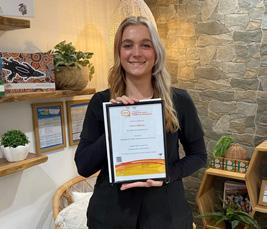


Marley: Little Scholars Ormeau 1Certificate III (Trainer Hayley)
Mary: Harristown State High SchoolCertificate II (Trainer Danielle & Kellie)

Millie: Harmony Early Learning Journey Greenslopes - Certificate III (Trainer Elisha)

Neve: St Saviour’s College - Certificate II (Trainer Danielle & Kellie)

Norma: St Saviour’s CollegeCertificate II (Trainer Danielle & Kellie)
Rebecca: Beenleigh MontessoriCertificate III (Trainer Melissa-Ann)
Richelle: Toowoomba Gardens Early Learning Centre - Certificate III (Trainer Kellie)

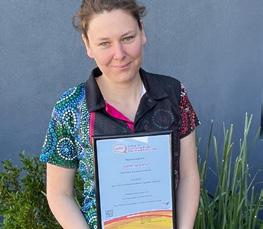


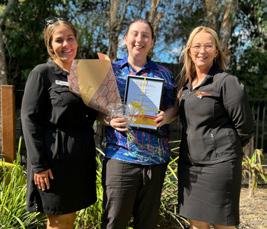

Sarah: Petit Early Learning JourneyBurdell 1 - Diploma (Trainer Lainie)

Savanna: Little Ducks AnnerleyCertificate III (Trainer Elisha)
Shiyao: Search Light Early Learning
Sunnybank - Diploma (Trainer Brooke)
Tahlia: Harristown State High School -
Certificate II (Trainer Danielle & Kellie)
Tran: Bright Start DrewvaleCertificate III (Trainer Pauline)
Yeon: Mundubbera Family Day Care
Nth Bennett Region - Certificate III (Trainer Melissa-Ann)
Zoe: Busy Bees at BeenleighCertificate III (Trainer Hayley)
We’re always looking for fresh content and ideas from our members, for our members. Be part of important discussions about the early learning sector by submitting your article!

Some topics we like to include are, health & nutrition, workplace health & safety, technology & innovations in early learning, educator health & wellbeing, and more! Please note that we do not accept articles of an advertorial nature, and all submissions are subject to approval.


Looking to gain brand-awareness?
Check out our advertising packages! We have several advertising opportunities available all year round, including in our quarterly magazine.